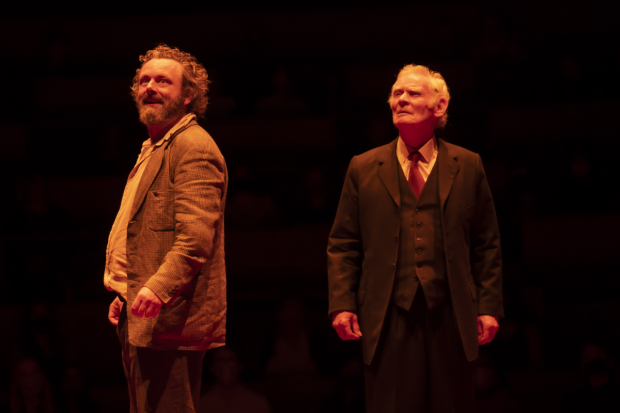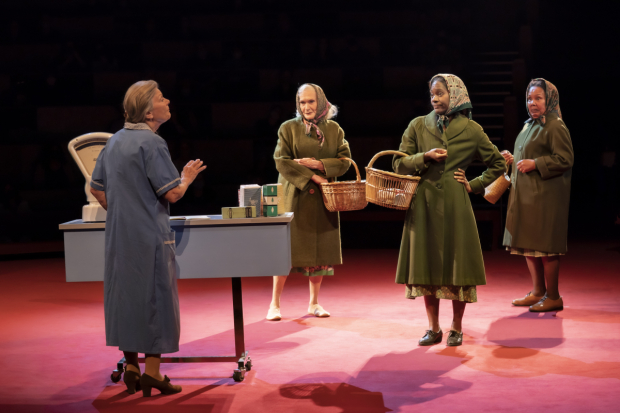Review: Under Milk Wood with Michael Sheen (National Theatre)
The Olivier stage opens for a Dylan Thomas revival

© Johan Persson
To hear Michael Sheen deliver Under Milk Wood feels akin to witnessing Gielgud's Hamlet or Rylance's Rooster Byron. It is nothing short of theatrically seminal.
As hoped, the poetry is magnificent. He orchestrates Dylan Thomas's posthumously performed masterpiece as a maestro conductor, all waving hands and syncopated rhythm. There are times when his words seem to literally hang in the air, leaving the socially distanced Olivier audience hypnotised. I could listen to him say "Now behind the eyes and secrets of the dreamers in the streets rocked to sleep by the sea…" on loop forever.
But this is no ordinary rendition. Siân Owen has scripted a framing device that sets the action in a care home, where after a lengthy establishing scene Sheen arrives hoping to connect with his ageing father. Will the dreams of Llareggub (I surely don't need to highlight what it spells backwards) fire the embers of his long-lost memories?
It's a neat idea that sees the home's staff and residents become Thomas's cast of Welsh seasiders, and adds a poignant subtext in the relationship of Sheen's alcoholic narrator and his father (played with impeccable understatement by Karl Johnson). He is forever seeking not just his acknowledgement, but his approval.

© Johan Persson
The concept doesn't always feel completely cohesive – it seems strange that everyone so willingly joins the performance when Sheen's character is so cold and skittish with them initially – but Lyndsey Turner's beautifully choreographed in-the-round production is convincing enough to override such niggles.
The metanarrative also has the noticeable effect of causing Sheen to speak as if he is conjuring Dylan's words on the spot. This lends both an immediacy to the language and also a purpose to its rich imagery – after all, here is a man desperately trying to paint pictures in his father's addled imagination. Under Milk Wood is in some sense a victim of its own familiarity, and Turner's staging lends a much-needed freshness over reverence.
The ensemble contains several striking turns including Siân Phillips' scandalous Polly Garter, Anthony O'Donnell's haunted Captain Cat, and Alan David's simmering Mr Pugh, quietly reading Lives of the Great Poisoners as he dines with his hated wife (Cleo Sylvestre) and an icicle forms above their heads.
Merle Hensel's minimalist set allows the props to take centre stage. A zimmer frame, a drinks trolley, a laundry caddy that becomes Nogood Boyo's boat – all serve as valuable reminders this is a play-within-a-play. The dust sheets that cover everything initially also have the eerie quality of reminding us that our stages have sat unused for so long.
The programming choice has been questioned but seems canny in the current situation. The care home setting in itself has resonances of the horrors such places have witnessed in the past 18 months, and the emphasis on dreams and stories as a means of escaping current reality is also relatable. For audiences still adjusting to a new world, Thomas's nostalgic Welsh lullaby proves a suitably gentle, sombre, and loving reintroduction to theatre.












